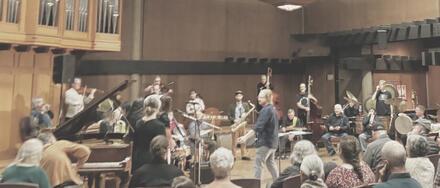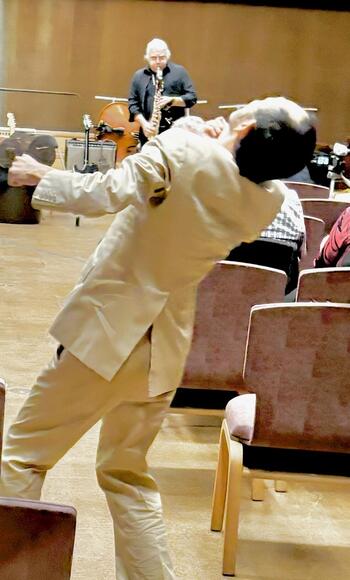Vibrations traveled and commingled earth to sky and back and all around in memory of Will Salmon, who co-founded the monthly Sunday Evening Concerts series in which all this night's participants took part over many years prior to his June 1 death from cancer. Drummer Alex Cline curated the series; he also organized this memorial bill and acted as its MC. It was an emotional and appropriate tribute to a musician, actor and dramaturge who played an incalculable role in the Los Angeles artistic scene, expressed in many short performances.
Jie Ma began with a brain-cleansing solo invocation via the penetrating resonances of her voice and a few very different instruments.
Next came the keening voice of Tany Ling, the high droning sounds of her aeolian harp, and her ghostly white robe and scarves flowing in the indoor wind. Otherworldly.
Dwight Trible gave three octaves of rich, wordless voice to the communal grief, at times joined in wondrous unison by the underworldly tones of William Roper's tuba, as Garth Powell's drums and percussion chopped the lengths of tone into manageable sections.
Veteran pianist Ben Rosenboom angled his arm across the keyboard to disperse sprays of tangled beauty; Garth Powell's drums thundered to lift up the spirits of Miller Wrenn's sighing bowed bass and Dan Clucas' somber cornet.
Trio 919 paired the flowing physicality of Tony Green & Breeze Smith's bass & drums with the cutting slash of Vinny Golia's nonstop soprano-sax onslaught, which inspired guest vocalist Trible to even greater howls of deeply felt pain. The group hit a strong groove before finishing with the tinkle of bells. The warm hug between Trible and Golia afterward reminded us that they, along with Cline, had joined in the rapture of Horace Tapscott's Pan Afrikan Peoples Arkestra over 40 years ago. So much history here, and so much love.
A sextet fronted by the contrasting cornets of Bobby Bradford & Dan Clucas splayed out an autumnal range of colors. Bradford, 90, blew with greater clarity and purpose than we've seen in years, his sweet & low tone sometimes evoking a jazz "Taps," sometimes falling to a graveside murmur. Clucas' muted horn rang with indignant incredulity, while the bass & drums of Tony Green & Breeze Smith throbbed a heartbeat, or Smith's sticks rattled like dry bones. Scott Heustis' guitar filled in the spaces with electronic smoke.
The first set ended with the always riveting butoh dancer Oguri (above) traversing the entire wing of the church complex with his incredible slow-motion twists and facial contortions, spurred by the tireless woodwinds of Vinny Golia and aggressive keyboard accents from Wayne Peet. You've heard of the Judas goat, upon whom the sins of the people are laden before it is driven from the city? That was Oguri, feeling every political and personal pang of this audience.
Vocalist Bonnie Barnett, windman Richard Wood & co. are renowned for their Group Hums, Barnett's way of bringing Tibetan transcendence to the material West. A bunch of instrumentalists and hummers got up, hit the requested notes of the G chord along with attendees, and we breathed the spirit along with Will. It was not corny.
The trio of soprano Roksana Zeinapur, windman Alexander Vogel and percussionist Jonathan Saxon improvised on a Will Salmon text about waking to us in the resurrection. Zeinapur's floating, well trained, sometimes electronically looped voice, along with Vogel's circular breathing on soprano sax, brought out the right feeling of ethereal return, and we could understand Zeinapur's connection with Salmon, a remarkable vocalist, in his Open Gate Theater.
The long-running chamber unit Present Quartet began with the sounds of breath through Ellen Burr's flute and Charles Sharp's alto sax, but soon went tonal to tell tales of glad and sad reminiscence, the strings of Anne LeBaron's harp and Jeff Schwartz's bass leading the circuitous way to a signless crossroads. Never fear, though -- what seemed scattered coalesced at the end into a whiff of hope.
Perfectly placed midway through all the improvisations came the trio of violinist Jeff Gauthier, cellist Maggie Parkins and pianist Vicki Ray, performing a "Study on Ancient Scales" by Harry Partch, adapted from an arrangement by Ben Johnston. This tightly played piece not only highlighted Salmon's obsession with Greek mythology, but showcased the long-marinated interaction of Gauthier (sweet but assertive) and Parkins (colorful and sometimes appropriately raw). In addition to crisp keyboard attack, Ray often dug into the piano's interior for brisk zitherish strokes to hustle this dignified, lyrical march along. A real hit.
The Awakening Sound Ensemble was Cline, Gauthier, Parkins and Ray, plus Kozue Matsumoto on koto; they all strove to fill some of the spiritual space left by former member Will Salmon. It began with a symphony of meditative overtones, proceeded through the quick bowings and raindrop plucked instants of a busy life, boiled to turbulence and subsided with surprising suddenness, leaving us breathless.
In a hue-bespattered dress, dancer Roxanne Steinberg writhed around the space with great command and containment, providing an emotional focus that balanced the projected visuals of the ever-valuable Kio Griffith's boat on dim waters or crow on a branch. Cline, meanwhile, encouraged her to surge or fade with rolling toms, or cymbals that rushed like the tide or cried when bowed like guitar feedback, until she turned away and subsided into silence.
A funeral blues jam began in primordial soup and coalesced into a slow groove around the unmistakable lava bubbles of Steuart Liebig's bass and the gentle thud of Breeze Smith's drums. The slide guitar of G.E. Stinson, who had abandoned his halfmonk look for rockstar coif and faux leather, cut through with authority, and each note of Bradford's cornet contained an encyclopedia of blues. Trible moaned, Darryl Tewes dialogued with Liebig on bass, and Cline wrapped it up with a resounding whack on a squat box. A reason to smile.
A chamber group featuring Bruce Friedman (trumpet), Alexander Vogel (woodwinds), Ellen Burr (flute), William Roper (tuba), Wells Leng (prepared piano) and Miller Wrenn (bass) kept up a lively conversation -- literally in the case of Roper, whose improvised speech was part of the incitement. Roper's staccato tuba bursts also buffeted the neatly balanced interaction, which was designed to end with the desertlike blowing of the instruments' noteless wind.
The program closed with a stageful of performers under Miller Wrenn using "conduction" methods similar to those pioneered by the likes of Butch Morris and Adam Rudolph -- hand signals, plus chords spontaneously written on small whiteboards and shown around. It began well, with sustains of strings and the angelic voices of Roksana Zeinapur and Tany Ling supporting spirited solos by Golia (unforgiving piccolo) and Bradford (soulful cornet). Cline paradiddled the abstractionist march; Wells Leng's pipe organ swelled; Oguri whirled; Steinberg danced like a broken puppet; the two very different dancers moved together. Wrenn brought the mass to a crescendo, and it might have stopped there, but no one wanted it to end, so the chord cards kept coming, to the point that Oguri humorously mimed the motion.
When it was all over, Cline rang his little temple bell, as he so often does. Everyone looked around, glad to have seen one another, but with a sense of disbelief, which did not dissipate.

PHOTOS BY FUZZY BROK

